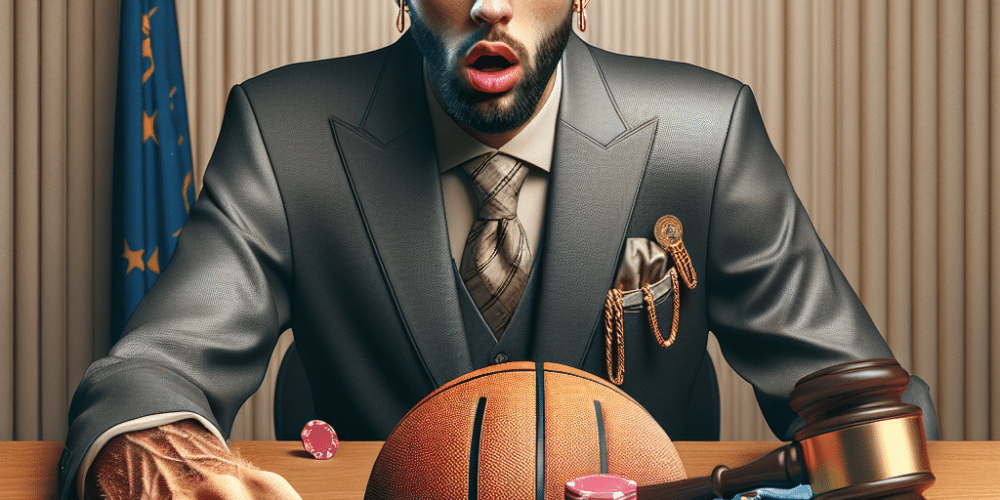On Thursday, in a high-stakes confrontation at the U.S. District Court in Brooklyn, former NBA player and coach Damon Jones declared his innocence against serious federal accusations. The charges suggest that he leaked sensitive team information and participated in manipulated poker games connected to organized crime.
Damon Jones, aged 49 and a former guard for the Cleveland Cavaliers, presented himself to answer allegations that have shaken both the sports and legal communities. The federal prosecutors have laid out two intertwined cases against him: one involving a poker scam and another concerning illegal sports betting practices. The court decided to release Jones on a $200,000 bond, secured by his family residing in Texas, as he awaits his trial.
This legal storm is part of a broader federal investigation that has ensnared more than 30 individuals. Among those caught in its net are notable figures such as Chauncey Billups, coach of the Portland Trail Blazers, and Miami Heat guard Terry Rozier. The prosecution claims that Jones provided a sports bettor, identified as Marves Fairley, with confidential information regarding the injuries of NBA stars like LeBron James and Anthony Davis. Fairley, facing similar charges, has also pleaded not guilty.
According to the prosecution, in February 2023, Jones allegedly informed a friend that LeBron James would not be playing in a Los Angeles Lakers game against the Milwaukee Bucks, a detail unknown to the public at the time. This inside information was purportedly used to encourage the friend to place a significant bet against the Lakers. A similar incident was highlighted from January 2024, where Jones is said to have misled about Anthony Davis’s playing time in a matchup against the Oklahoma City Thunder. Contrary to the information given, Davis played extensively and was instrumental in securing a victory for the Lakers.
The narrative takes a darker turn as federal prosecutors accuse Jones of receiving approximately $2,500 from Fairley for one of these insider tips. When the anticipated outcome did not materialize, Fairley reportedly demanded the return of his money.
In a related charge, Jones is accused of facilitating poker games engineered to deceive affluent participants. These games allegedly exploited rigged shuffling machines, hidden cameras, and other manipulative devices to influence the outcome in favor of the organizers. Jones’s role, according to investigators, was to serve as a recognizable figure to attract players, earning modest compensations for his contributions.
The investigation reveals connections between these gambling schemes and notorious New York crime families, including the Gambino, Genovese, and Bonanno syndicates. These organized crime groups reportedly profited from the earnings and employed intimidation tactics to enforce debt collection.
Reflecting on Jones’s background, he hails from Galveston, Texas, and enjoyed an 11-year career in the NBA from 1999 to 2009, during which he amassed career earnings exceeding $20 million. Renowned for his three-point shooting prowess, Jones transitioned post-retirement into a coaching role, contributing to the Cleveland Cavaliers’ championship victory in 2016.
Jones’s legal counsel, Kenneth Montgomery, indicated that negotiations with federal prosecutors are ongoing, and the possibility of a plea agreement remains open. The former NBA player is scheduled to return to court for a preliminary hearing on November 24.
As the case unfolds, it captures the attention of not only sports enthusiasts but also legal experts, given the significant and complex nature of the allegations. The involvement of organized crime adds layers of intrigue and concern, prompting discussions about the vulnerabilities athletes might face in terms of exploitation for illicit activities.
From another perspective, some argue that athletes, given their public profiles and financial resources, should exercise greater caution to avoid entanglement in illegal ventures. This viewpoint suggests that individuals such as Jones, who have experienced substantial financial success, might bear the responsibility to safeguard their integrity and reputation more diligently.
Yet, others caution against jumping to conclusions, underscoring the principle that all individuals are presumed innocent until proven guilty. They argue that the complexities of legal proceedings and the potential motivations behind accusations merit a careful and deliberate examination of evidence and testimonies.
The story serves as a pointed reminder of the intersections between sports, crime, and justice, casting a spotlight on the challenges that athletes may face off the court. The legal proceedings will undoubtedly continue to unfold with significant public and media interest, as the sports world watches closely to see how the case against Damon Jones develops.

David Garato is a luminary in gaming journalism, renowned for peeling back the curtain on the gaming world with his witty and insightful commentary. A decade into weaving stories from the pixelated edges of indie games to the expansive universes of AAA titles, David’s work is a thrilling blend of analysis and adventure. When not writing, he’s live-streaming, sharing his gaming exploits with an engaged and growing audience. David doesn’t just write about games; he lives them, making him a trusted guide in the gaming community.
















